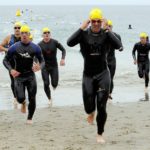Become a Morning Person
A lot of people overlook the importance of starting their day right. And according to 12-time Olympic medalist in swimming, Natalie Coughlin, it’s time to say goodbye to late night outs and embrace your mornings. People sleep late and thus wake up late or they eat an unhealthy breakfast. You are not doing yourself any favors by starting the day off with a slice of pizza or doughnut. Rid yourself of unhealthy morning habits and start the day right by sleeping and waking up early and eating a well-balanced breakfast.
Supplement Your Workout With Adequate Meals
As Kerri Walsh, an Olympic competitor in Volleyball, advocates, fueling your body with enough nutrition is key to achieving peak performance during your fitness training. Moreover, eating enough food plays an important role in your body’s ability to recover rapidly after an intense workout. The volleyball star advises eating at least an hour before your scheduled workout routine and immediately eating food high in protein afterward. Take a minute or two in between your workouts to reach for an energy drink or a protein bar. This will keep your energy levels consistently high so that you can complete your workout without slowing down or fatiguing.
Warm Up and Cool Down
Following 15 minutes of a light jog or cycling session, Andrew Knight New Canaan advises spending at least 10 minutes on dynamic movements, like reverse lunges. Knight is a rising Baseball star and a product of New Canaan, Connecticut. What you do before and after a training session is unarguably as important, if not more, as the workout itself. It will determine how well your body will perform during the workout and how fast it will recuperate afterward. Tested recovery methods, such as massages and resistance stretching, can help lower muscle soreness and maintain limberness.
Make it a Group Activity
Olympic gymnast, Nastia Liukin, knows all too well the importance of achieving stability, given her career was spent mostly on balance beams. Health and fitness techniques can be difficult to consistently follow. Unless you strike the right work-life balance, you will always find it challenging to wake up at 6 in the morning to go jogging or avoid sugar and empty carbs for breakfast. A good way to strike that balance is by making fitness activities into a group activity. A busy mother of two, such as Nastia Liukin, and college student, like Andrew Knight New Canaan, are able to continue training for their competitions while also keeping up with their family and school obligations because they incorporate it together. If you have children, for instance, you can introduce fun physical exercises into family time.
Sleep Well
High quality sleep is more than just sleeping for a good 8 hours or drinking sleepy time tea before going to bed. Olympic athletes, like Michael Phelps, take sleep to the next level by using special altitude chambers to lull them to sleep. Unfortunately, these custom-made beds are very expensive and too bulky. Nonetheless, you can still achieve high-quality sleep in other proven techniques, such as setting up your room to be cool and dark and keeping electronics away from your bed. If you need an alarm clock to wake you up in the morning, use a regular alarm clock instead of your smartphone.
Record Your Performance
You have no precise way of knowing if your performance is improving without a detailed record. A training book not only tracks your improvement but also lets you know when you can add more weight or repetition to your training regimen. Eliud Kipchoge, a seasoned marathon runner, habitually tracks his performance with a training book that details his bedtime and nap hours as well as other key details of his workout. Record your career objectives, wins, losses, setbacks, cardio time, etc.
Have Fun With It
American gymnast, Simone Biles, is a great example of someone who doesn’t let the physical rigors of training and competition get the best of her emotions. Unlike a lot of Olympic athletes, she can often be seen smiling, giggling, and overall in a more relaxed state. Don’t take your workouts too seriously. While pushing yourself requires you to be tough and all business, take a few minutes of your workout to talk with a fellow fitness enthusiast or to try out different physical movements.











